WHAT THEY BECAME
UKRAINE
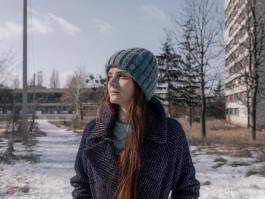
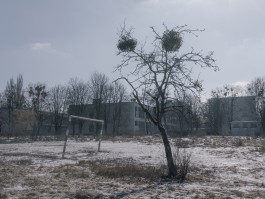
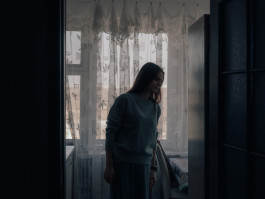
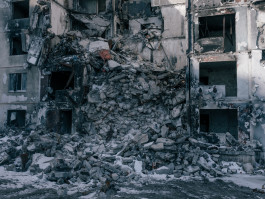
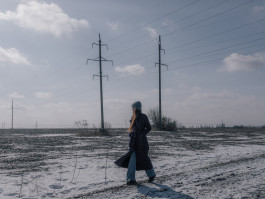
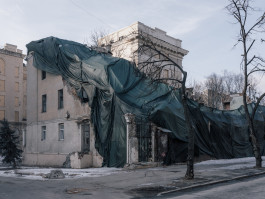
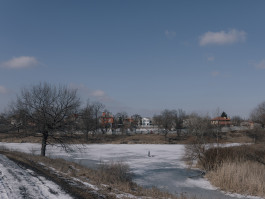
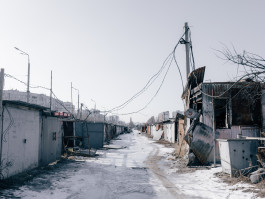
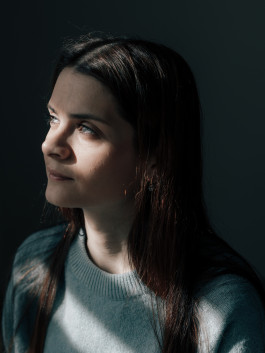
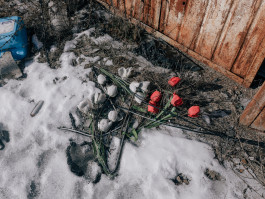
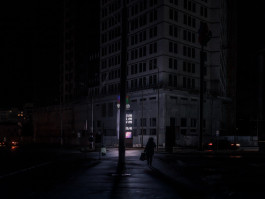
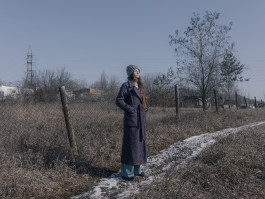
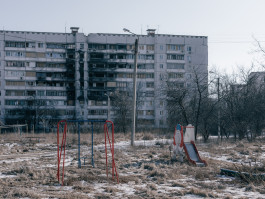
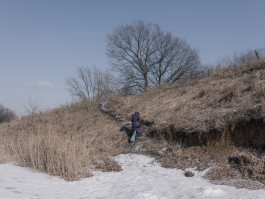
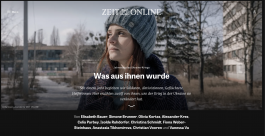
1 Year Ukraine War - What they became.
Anastasija Hriaznova has returned to Kharkiv despite all warnings to be with her slain husband - and to stay.
"I can't see these suitcases anymore," says Anastassija Hriaznowa. Her webcam shows a white wall behind her, with unhung pictures leaning in the corner. Hriaznova is back in Kharkiv, the city where she was born and raised. In which, as she says, she worked and loved and from which she does not want to leave again, even if bombs are still falling. She would rather start all over again here, among the rubble.
In the video call, she seems bright, relaxed, almost cheerful. She smiles a lot, quite different from last spring in the small Polish town of Zielona Góra. At that time, she had just lost the man she was about to marry. The couple had fled west at the end of February. Halfway there, he returned as a volunteer. For days she heard nothing from him, then that he was dead. In May, Hriaznova now recounts, she too returned. "It was time," she says, "I already couldn't go to his funeral.
Family, friends, colleagues - no one approved of her decision, she says, but neither did they question it. "Everyone has their reasons for fleeing, and everyone has their reasons for going back home," she says.
She says the sister she stayed with in Poland packed her car full of food, salt, sugar, canned goods, sausage. Extra gasoline, too. With that, she says, she drove all the way to Lviv, and from there a family friend accompanied her to Kharkiv. "The city was empty," she recalls. Destroyed streets, hardly any people, almost only men. There were maybe five cars in the parking lot. Her father helped her carry her things upstairs. A friend - the girlfriends had all fled - cooked her borscht.
In the meantime, the parking lot was full again, many restaurants and cafés were open, beauty salons could be visited in the shopping center, and children were playing in the streets. The supermarket around the corner had only closed the bombed floor, in the others the freezers continued to hum. "Kharkiv is a city full of contrasts," she says, adding that you quickly get used to it. Nothing would shock her anymore.
She was actually only afraid of entering the apartment they shared again. On the one hand, she says, she immediately felt at home. But there was also this feeling that he could come back at any time. After all, his things were all still there, as if he had only been gone for a short time. "I didn't have the heart to change anything in the apartment," she says. She endured six months in the midst of these preserved memories, then gave the key to his relatives and moved into her own apartment.
There, she says, she is freer. She's trying to buy things, settle in, build something like a home: "It's a crazy idea in the midst of war, but it helps me get my mind off things."
Words by Vanessa Vu
Published at DIE ZEIT
© Bartosz Ludwinski 2010 - 2022, Disclaimer & Privacy Policy
WHAT THEY BECAME
UKRAINE
1 Year Ukraine War - What they became.
Anastasija Hriaznova has returned to Kharkiv despite all warnings to be with her slain husband - and to stay.
"I can't see these suitcases anymore," says Anastassija Hriaznowa. Her webcam shows a white wall behind her, with unhung pictures leaning in the corner. Hriaznova is back in Kharkiv, the city where she was born and raised. In which, as she says, she worked and loved and from which she does not want to leave again, even if bombs are still falling. She would rather start all over again here, among the rubble.
In the video call, she seems bright, relaxed, almost cheerful. She smiles a lot, quite different from last spring in the small Polish town of Zielona Góra. At that time, she had just lost the man she was about to marry. The couple had fled west at the end of February. Halfway there, he returned as a volunteer. For days she heard nothing from him, then that he was dead. In May, Hriaznova now recounts, she too returned. "It was time," she says, "I already couldn't go to his funeral.
Family, friends, colleagues - no one approved of her decision, she says, but neither did they question it. "Everyone has their reasons for fleeing, and everyone has their reasons for going back home," she says.
She says the sister she stayed with in Poland packed her car full of food, salt, sugar, canned goods, sausage. Extra gasoline, too. With that, she says, she drove all the way to Lviv, and from there a family friend accompanied her to Kharkiv. "The city was empty," she recalls. Destroyed streets, hardly any people, almost only men. There were maybe five cars in the parking lot. Her father helped her carry her things upstairs. A friend - the girlfriends had all fled - cooked her borscht.
In the meantime, the parking lot was full again, many restaurants and cafés were open, beauty salons could be visited in the shopping center, and children were playing in the streets. The supermarket around the corner had only closed the bombed floor, in the others the freezers continued to hum. "Kharkiv is a city full of contrasts," she says, adding that you quickly get used to it. Nothing would shock her anymore.
She was actually only afraid of entering the apartment they shared again. On the one hand, she says, she immediately felt at home. But there was also this feeling that he could come back at any time. After all, his things were all still there, as if he had only been gone for a short time. "I didn't have the heart to change anything in the apartment," she says. She endured six months in the midst of these preserved memories, then gave the key to his relatives and moved into her own apartment.
There, she says, she is freer. She's trying to buy things, settle in, build something like a home: "It's a crazy idea in the midst of war, but it helps me get my mind off things."
Words by Vanessa Vu
Published at DIE ZEIT
© Bartosz Ludwinski 2010 - 2022, Disclaimer & Privacy Policy